Interview: 're:group' performance collective
Cristian Speranza: "re:group performance collective is an independent theatre company comprised of dear friends who work together to make “live cinema” and contemporary performance."
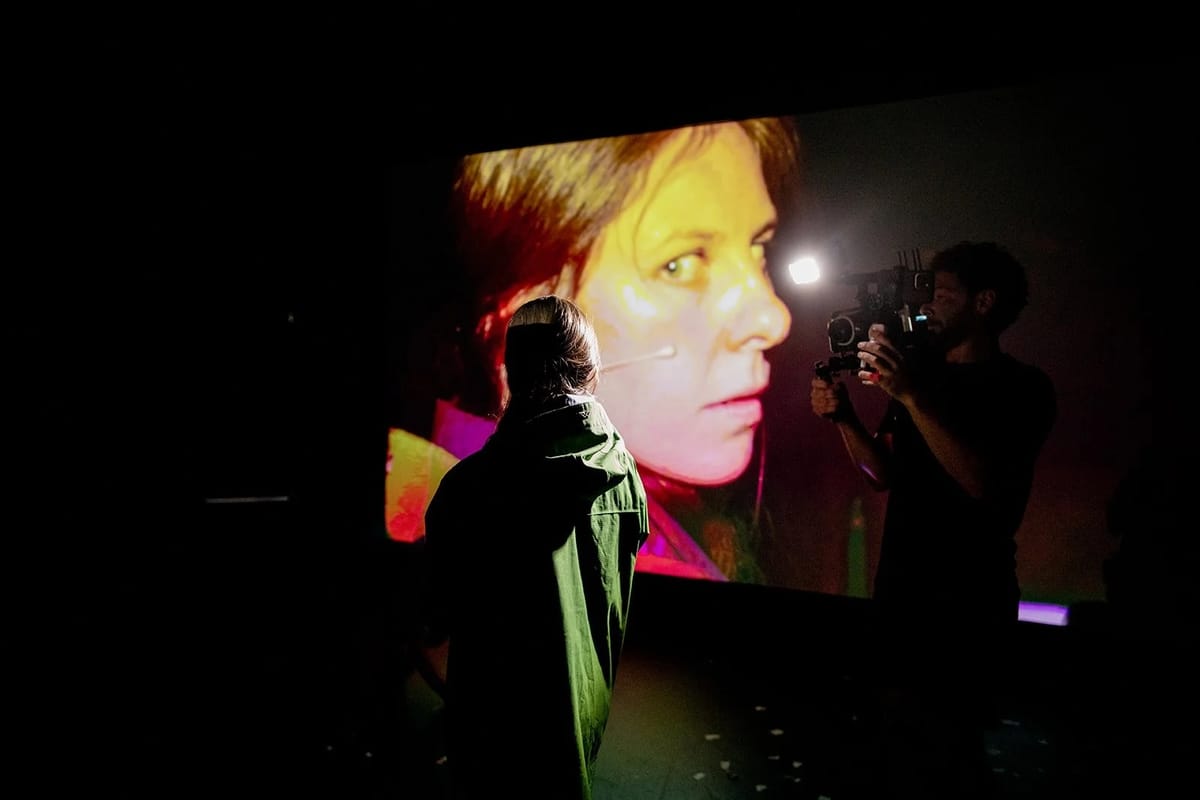
Interview conducted by Cristian Speranza
Borne out of a shared passion for both theatre and cinema, re:group performance collective is an independent theatre company comprised of dear friends who work together to make “live cinema” and contemporary performance. They are Mark Rogers, Solomon Thomas, Malcolm Whittaker, Steve Wilson-Alexander and Carly Young. Their recent works, such as 2022’s Coil and 2024’s POV, find the group dwelling on contemporary themes of loss, nostalgia and mental health with an incredibly fresh and potent lens. I had the opportunity to speak to Director and Video Designer Solomon Thomas, and Creative Producer Malcolm Whittaker, just as POV’s run was ending, with the pair reflecting on re:group’s cinematic influences, the formal applications of ‘play’, and bringing Phillip Seymour Hoffman back to life.
The origins of Re:Group, and the marriage of film and theatre…
SOL: We went to Wollongong Uni together and studied theatre making, and there's a rich history of using film in theatre. It's not a thing that we came up with or were suddenly like, oh, maybe this is the best idea in the world. A lot of us were studying artists like the The Wooster Group and Gob Squad, who are predominantly theatre makers, and use live cinema, but they wouldn't call it live cinema. They use video, sometimes it’s live video, but often they're not referencing it as cinema, but rather ‘mediatized performance’ or ‘digital practices’. So, we started from a place not of film and theatre, but rather of theatre. We're all theatre nerds and were very influenced by a strong history of this kind of stuff.
MAL: We have made a few short films, but predominantly it's a theatre event of which a camera is employed to realise the idea, and the camera isn't this prosthetic addition, it’s integral to what the show's about. It's not kind of fancy gimmicky-gadgetry, but is actually part of a holistic dramaturgy. I think it's fair to say that we came to it, like so many young artists do, through emulating what's around us. Emulation is an integral part of your learning process, the way in which you emulate is kind of derivative of what's around you. You're basically just doing covers of the artists you like. Then eventually as you pursue it, you find your own voice. That's what we've got now, and I think that Coil particularly marked something of a threshold of really finding our own voice. When I'm in these conversations trying to get us funding and commissions, I try to point out that the cameras and the tech belie the essence of the work, which is a group of mates hanging out, making shows that invite you in.
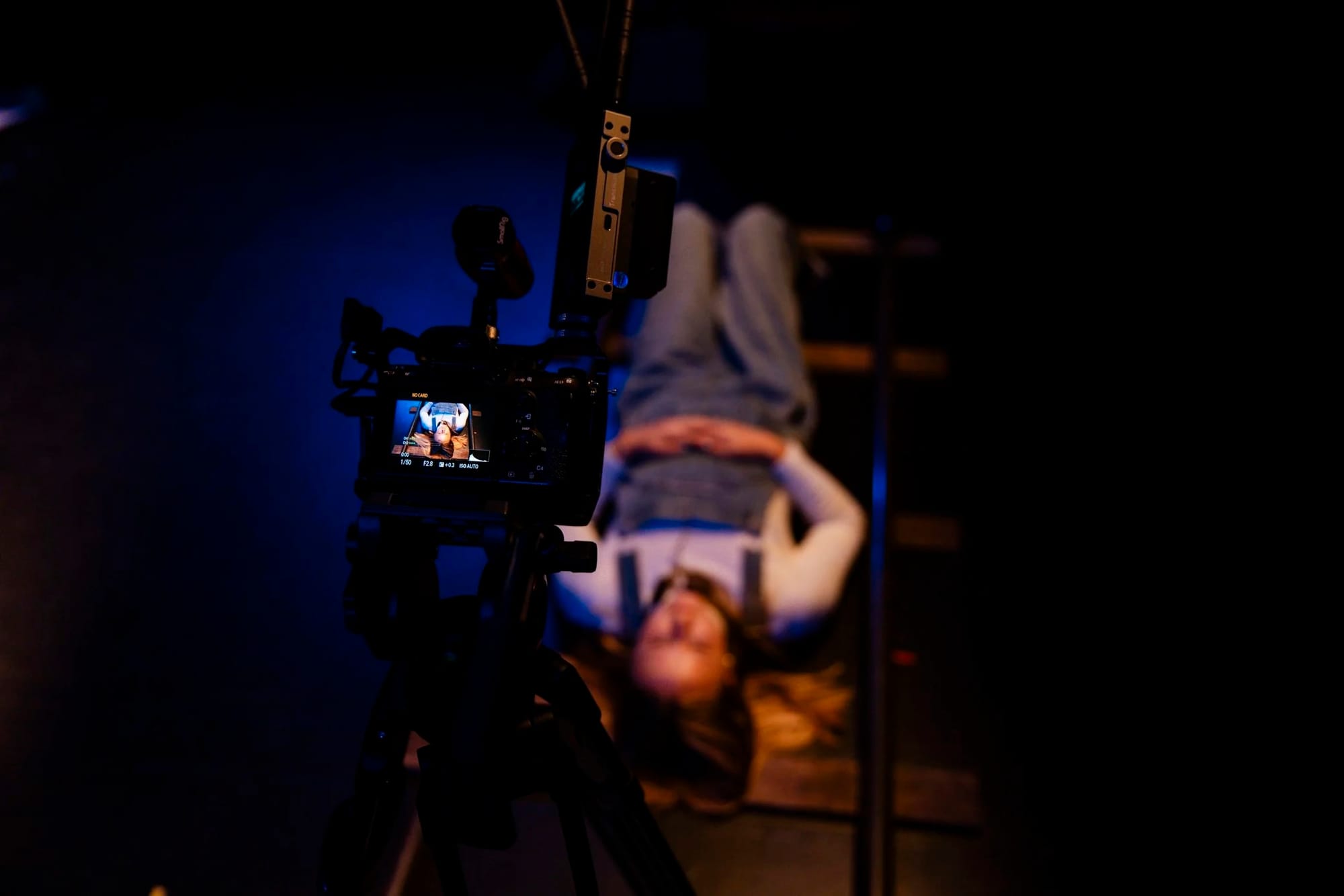
SOL: Jackson, who kind of started re:group with Carly and a whole group of people in their year, went to this workshop with Richard De Domenici. He is this artist who takes films and remakes them where they're actually set. He came to Sydney and remade The Matrix shot for shot in Sydney where it’s set, but with local artists. Then we did this show Lovely where we remade scenes from Philip Seymour Hoffman’s [filmography], and we tried to, as some sort of gesture of theatrics, bring Philip Seymour Hoffman back to life, by reincarnating him through copying him in the film.
MAL: What Sol's referring to though is a live theatre version, channelling ideas of the shot for shot remake and playing with the ways in which performance and film keep people alive. There's this moment at the end of it which stayed with me, when Jackson says words to the effect of “if we've done our job well enough, Philip Seymour Hoffman will walk through that door.” And it's a rather ridiculous notion, but there's this feeling in the room of, “oh, what if he did, you know?” So you've got this moment of suspending basic logic as part of the experience of how sincerely this ironic task was undertaken. And I think that's a re:group thing too, of balancing irony and sincerity and having pathos shine through.
SOL: The other thing we're doing with film in theatre is capitalising on one of the stronger languages that permeates mass culture nowadays. We say we make a film, but if you watch [the film from Coil] by itself, it wouldn't make any sense. It doesn’t make sense as a film. You, the audience, are filling in all your understanding of film to add on to those things, to create your version of a film. It's a theatre show. And same with POV. We did a run of POV where the camera wasn't working. The camera broke for just one run in rehearsals. And we ran it without the camera, and it made sense, and you didn't need the camera to be working. It could have just been a prop.
Pointing, laughing and sweating in the theatre…
MAL: I think there's something about stakes too, right? Do you know this Mike Figgis movie, Timecode? It's one of those one-shot movies – they're quite theatrical, right? And staying with Coil in particular, these stakes are raised for the accomplishment of shooting the faux movie within the world of it. With those one-shot movies, you're never quite sure…but there's no cutaway in Coil or POV. And so, you can feel that, and it draws you in with this kind of empathy with us as artists trying to pull off this thing while we hang out together.
SOL: I think there's an important difference between film and theatre. Film can take you into worlds, take you places you've never been and it can cut and it can skip time and it can fly and go underwater and theatre can do none of those things. Theatre is only an act of asking someone to imagine they're going somewhere else, but essentially, you're in a black box. Film can take you somewhere else, theatre should be present and engaging and exciting and hard and you should watch the sweat pour off the actor's face. And you should feel that.
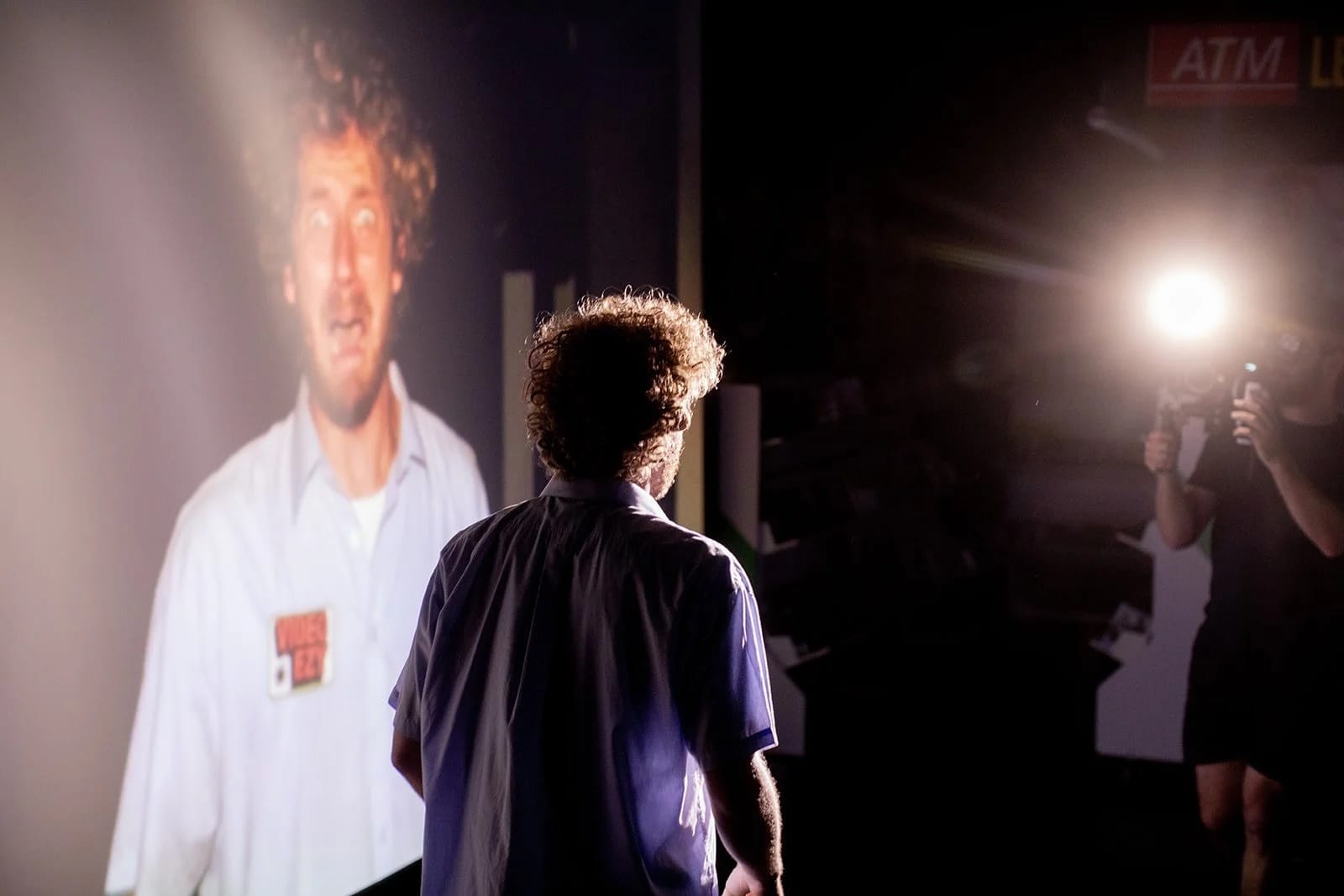
MAL: In spite of loving theatre, we're also not that reverent with it, right? There's a lot of jokes at the expense of theatre and to wax a little pseudo intellectual, there's this David Foster Wallace essay about why he hates Seinfeld and postmodern television. He talks about how “all it does is point and laugh at things but offer nothing in its place”. I think about that in relation to what we do too. We're often pointing and laughing at the failings of theatre, as Sol says, to really create a world. But we point and laugh at this stuff, but then soldier on and try to do it anyway. It’s in that soldiering on to make something despite the futility of actually achieving anything that I think resonates with audiences.
Gambling with the unexpected and the essence of re:group…
SOL: We did a showing of another work recently and Carly came to see it, and her feedback was, ‘where's the flaming chainsaws?’ And we were like, oh, fuck, where are the flaming chainsaws? Something we think about a lot is making sure that failure is possible. If the show can’t be broken somehow then it is trying too hard to be like a film. The reason for POV was, Mark was like, let's give one kid all the power on stage and let them do all of it. The core reason we did it was because if you had an actor who had rehearsed in there, they would be more powerful than the kid. Then how we talk to that kid about emotions is the second core, but at its essence it was this question of how do we give a kid power. We were sitting in rehearsals being like “well we could have like a pre-recorded voice that's the parents or we can make actors rehearse it but they like just make sure the kid is more powerful” and we were like none of that will work the only thing that will work to give this kid power is if none of the adults know what they're doing.
MAL: The documentary of POV is watching the actors do what the kid asks in a live setting, so whilst we're not making a real documentary movie, we are documenting their responses to being elicited to do a series of tasks by a young child, right? I think when most theatre shows, it's fair to say, would freak out if the microphone malfunctioned, we seem to get it time and time again that audiences think it's part of it. That's because of the act of play that we’re in. You overhear people in the audience on their way out say “I couldn't tell if that was part of it or not.” Because, I mean, if things fail for most artists, they freak out, but Solomon's just calm. It happened a lot more with Coil. Do you want to talk about that, Sol?
SOL: Well, it only did work twice, but in that way that's what the show was. Every day I would nervously sit backstage with a computer and be checking a hundred times if the code that we’d written was going to work and if my camera was working. I'd check everything a hundred times, get out on stage and something would inevitably go wrong always, every single time. So then you just have to sit in that, you have to just be like, okay, cool, it's going to go wrong.
MAL: This is at the moment in Coil when we go to play the thing back and the software would glitch. There'd be a bit of crowd work and Sol would frantically try to fix it. It used to annoy me in a certain way. I would just think of Solomon's tireless work to try to make it happen and have audience members go, “I guess it was just supposed to fuck up.” It was kind of being okay with that liveness, that charged moment of will it, won't it work, and then the catharsis on the other side of that when it does work heightens this experience of our engagement with the soldiering-on that we're performing.
re:group will be at the Melbourne Fringe Festival, 15-18 October with Auto-Tune. Details are available here.
Fleapit Pick of the Week
Dark Nights Film Festival kicks off tonight at the Ritz, promising a programme of independent horror and dark genre films. Most excitedly, there is a 4K restoration screening of Braindead by Peter Jackson, but be sure to check out the full programme here.
Screenings: Thursday 09 OCTOBER - Wednesday 15 OCTOBER
Cinema Astragale
Peter Ibbetson (Henry Hathaway, 1935)
Thursday
Dark Nights Film Festival | 9-12 October
Hell House LLC: Lineage (Stephen Cognetti, 2025)
Opening Night
Thursday
Aussie Shorts Showcase 2025
Saturday
Braindead (Peter Jackson, 1992)
Saturday
The School Duel (Todd Wiseman Jr., 2024)
Closing Night
Sunday
Pink Flamingo Cinema
Crime Wave (John Paizs, 1985)
Wednesday
Slippery Screenings
The Last Dive (João César Monteiro, 1992)
Friday
SXSW Sydney | selected highlights
In Conversation with Edgar Wright
Monday
Pure Scum (Gideon Aroni, 2025)
Tuesday
Spreadsheet Champions (Kristina Kraskov, 2025)
Wednesday
Greek Film Festival | selected highlights
Stelios (Yorgos Tsemberopoulos, 2024)
Special Event
Wednesday
Irish Film Festival | selected highlights
Fran the Man (Stephen Bradley, 2025)
Opening Night
Thursday
Irish Australian Shorts 2025
Friday
Bring Them Down (Christopher Andrews, 2024)
Saturday
Italian Film Festival | Sept. - Oct.
La Grazia (Paolo Sorrentino, 2025)
Sunday-Wednesday
Signorinella: Little Miss (Swan, McFadyen & Pricolo, 2025)
Friday-Tuesday
Looking for Alibrandi (Kate Woods, 2000)
4K Restoration - Closing Night
Wednesday
Hayden Orpheum | selected highlights
Grave of the Fireflies (Isao Takahata, 1988)
Thursday
After The Hunt (Luca Guadagnino, 2025)
Live-streamed Q+A w/ director
Friday
The Twilight Saga - All Day Marathon
Sunday
Robert Redford Tribute (link)
All the President's Men (Alan J. Pakula, 1976)
Thursday
Butch Cassidy And the Sundance Kid (George Roy Hill, 1969)
Saturday
3 Days of the Condor (Sydney Pollack, 1975)
Sunday
Golden Age Cinema | selected highlights
Splitsville (Michael Angelo Covino, 2025)
Thursday
The Last Picture Show (Peter Bogdanovich, 1971)
Friday
Sorry, Baby (Eva Victor, 2025)
Saturday
Picnic At Hanging Rock (Peter Weir, 1975)
Sunday
Ritz Cinemas, Randwick | selected highlights
The Travellers (Bruce Beresford, 2025)
Daily
Kangaroo (Kate Woods, 2025)
Daily
Jimmy Barnes: Working Class Man (Andrew Farrell, 2025)
Sunday
Jim Jarmusch Less Is More (link)
Down by Law (Jim Jarmusch, 1986)
Thursday
Cult Classics (link)
Mulholland Drive (David Lynch, 2001)
Saturday & Monday
Celluloid Film (link)
The Fifth Element (Luc Besson, 1997)
Friday
Classic Matinees (link)
Some Like It Hot (Billy Wilder, 1959)
Saturday & Monday
Make It Musical (link)
Cabaret (Bob Fosse, 1972)
Sunday & Wednesday
Meet Cute (link)
Forgetting Sarah Marshall (Nicholas Stoller, 2008)
Tuesday
Dendy Newtown | selected highlights
Kangaroo (Kate Woods, 2025)
Thursday-Sunday
Lesbian Space Princess (Emma Hough Hobbs & Leela Varghese, 2025)
Daily
The Travellers (Bruce Beresford, 2025)
Daily
Cells Out (link)
Kill Bill Vol. 1 (Quentin Tarantino, 2003)
Thursday
Universal Classic Monsters (link)
Bride of Frankenstein (James Whale, 1935)
Friday
Robert Redford Retrospective (link)
The Sting (George Roy Hill, 1973)
Friday
Out of Africa (Sydney Pollack, 1985)
Sunday
Palace Cinemas | selected highlights
The Travellers (Bruce Beresford, 2025)
Daily
Kangaroo (Kate Woods, 2025)
Daily
Cult Vault (link)
Fright Night (Tom Holland, 1985)
Monday
Matinee Memories (link)
The Night of the Hunter (Charles Laughton, 1955)
Saturday
Art Gallery of NSW
Film Series: Brazil! Brazil! A century of cinema
The Devil Queen (Antonio Carlos da Fontoura, 1974)
Sunday
Pixote (Héctor Babenco, 1980)
Wednesday

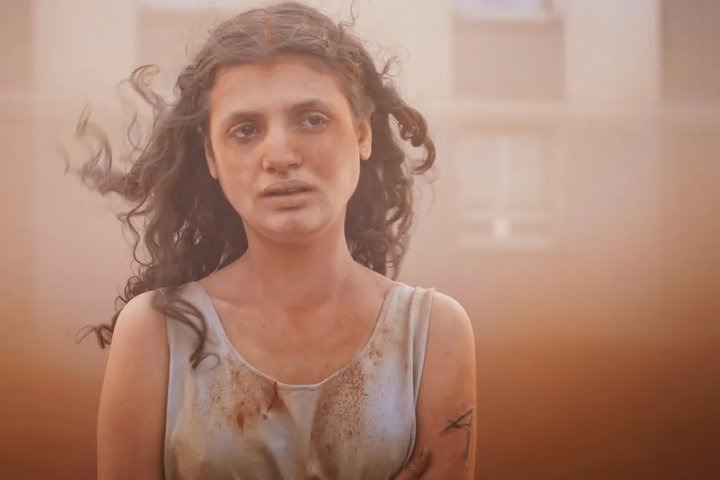
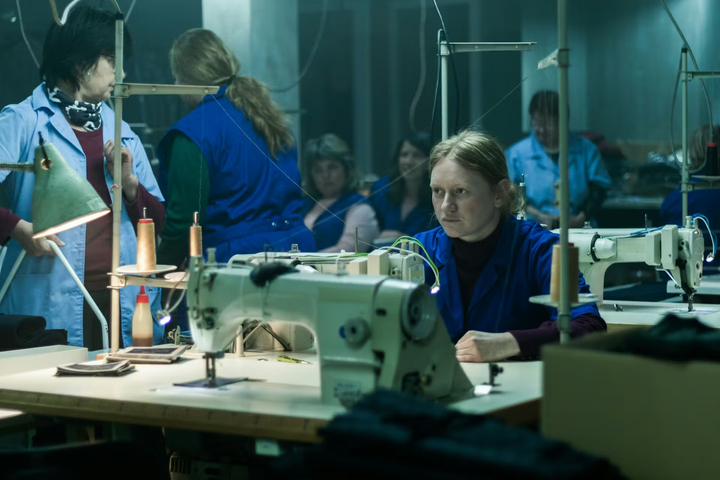
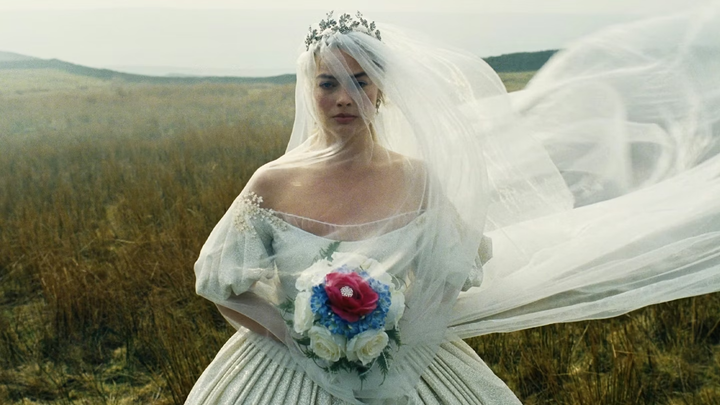
Comments ()